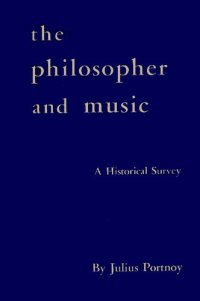
Ebook: The Philosopher and Music: A Historical Survey
Author: Julius Portnoy
- Genre: Art // Music
- Tags: pythagoras, philosophermusic00port
- Year: 1954
- Publisher: Humanities Press
- City: New York
- Language: English
- pdf
Here at last is a much needed book in the aesthetics of music which is probably the first of its kind in the English language. It will fill a definite gap in the musical and philosophical literature of American life. The author, an accomplished musician and teacher of philosophy, is well equipped musically and scholastically to write on the various philosophies of music which have existed in the Western world from the time of Plato to the present. Dr. Portnoy aptly demonstrates to what extent the philosophers have affected the course of music in Western civilization. He emphasizes the fact that philosophers have throughout history been pre-occupied with the ethical implications of music, the psychological effect which music can have upon mind and body, the proper relationship of words to music and a traditional distrust of musical innovations.
These four philosophic considerations were originally formulated in the writings of Plato, became an artistic actually in the music of the Christian Church, and in our own day constitute an aesthetic reality in the musical philosophy of the Soviet Union. The musical views of the philosophers have been appropriated by both theologians and statesmen in order to evaluate the role and effect which music should have in the church and state.
This book begins with an exhaustive philosophical study of music in Greece. It then goes on to show the effect of Greek philosophies upon the Fathers of the Catholic Church, and the influence which the churchmen in turn had upon the Protestant musical ideas of Luther and Calvin. The music of the Gothic, Renaissance, Baroque, Classical and Romantic, eras found the philosophers evaluating new musical developments and novel forms of musical expression with misgiving and suspicion. They based their judgment on the premise that the new music contained tonal dissonances and erratic rhythms which induced physical restlessness and engendered intellectual confusion in the listener that could eventually lead to political anarchy. Modern philosophers, with few exceptions, still tend to evaluate music along such lines of reasoning.
The latter part of the book deals with a study of music in our time, and ends with the author’s criteria of values for an aesthetics of music based on a philosophy of humanism. These criteria of values stem from the belief that music is on autonomous art whose meaning and nature consist of an expression of musical ideas which have value for us only if the music has meaning for us. Although the aesthetic experience is essentially emotive, the ability to make a discerning judgment of the value of the music depends on the degree of understanding a person has of the music to which he is listening.
These four philosophic considerations were originally formulated in the writings of Plato, became an artistic actually in the music of the Christian Church, and in our own day constitute an aesthetic reality in the musical philosophy of the Soviet Union. The musical views of the philosophers have been appropriated by both theologians and statesmen in order to evaluate the role and effect which music should have in the church and state.
This book begins with an exhaustive philosophical study of music in Greece. It then goes on to show the effect of Greek philosophies upon the Fathers of the Catholic Church, and the influence which the churchmen in turn had upon the Protestant musical ideas of Luther and Calvin. The music of the Gothic, Renaissance, Baroque, Classical and Romantic, eras found the philosophers evaluating new musical developments and novel forms of musical expression with misgiving and suspicion. They based their judgment on the premise that the new music contained tonal dissonances and erratic rhythms which induced physical restlessness and engendered intellectual confusion in the listener that could eventually lead to political anarchy. Modern philosophers, with few exceptions, still tend to evaluate music along such lines of reasoning.
The latter part of the book deals with a study of music in our time, and ends with the author’s criteria of values for an aesthetics of music based on a philosophy of humanism. These criteria of values stem from the belief that music is on autonomous art whose meaning and nature consist of an expression of musical ideas which have value for us only if the music has meaning for us. Although the aesthetic experience is essentially emotive, the ability to make a discerning judgment of the value of the music depends on the degree of understanding a person has of the music to which he is listening.
Download the book The Philosopher and Music: A Historical Survey for free or read online
Continue reading on any device:

Last viewed books
Related books
{related-news}
Comments (0)